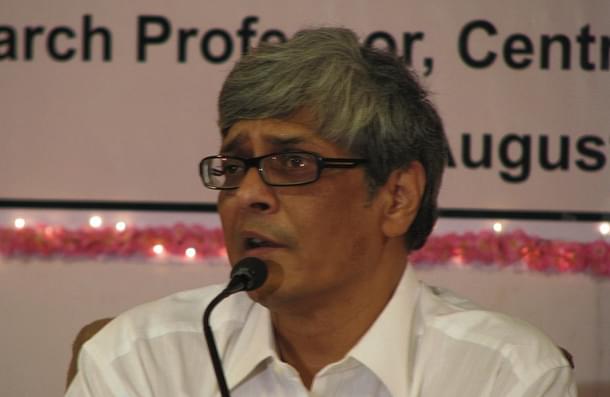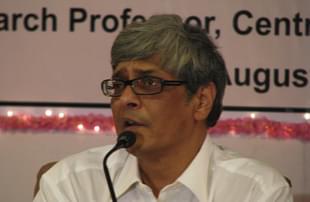Columns
Railways: Choice And Competition - XVII
Bibek Debroy
Mar 22, 2015, 01:00 PM | Updated Feb 24, 2016, 04:28 PM IST
Save & read from anywhere!
Bookmark stories for easy access on any device or the Swarajya app.


On the role of a regulator in railways, and to what extent, if at all, should it determine tariffs.
The usual caveat applies.
Let me focus on the role of a regulator, on the assumption that private sector entry will be permitted, not only in producing rolling stock, but also in running trains, both of the passenger and the freight variety. The Union Cabinet took a decision in August 2013. After seeking the views of the Law Ministry, Railways Ministry proposed the setting up of Rail Tariff Authority (RTA).
Pending an amendment in the Railways Act, the Railway Board, in a Resolution dated 27thJanuary 2014, proposed the setting up of an interim RTA:
“Now, therefore, the Government of India do hereby constitute the interim Rail Tariff Authority (RTA) under the overall administrative control of the Ministry of Railways as follows: The primary function of this Authority would be to develop an integrated, transparent and dynamic pricing mechanism for the determination of tariffs of Indian Railways and pending enactment of the requisite legislation, to advise the Central Government on fixation of tariffs for Indian Railways based on cost of operations and factors impinging on it, with a view to not only achieve its recovery but, also, generate requisite surpluses for healthy growth in times ahead.”
Paragraph 116 of the Railway Budget Speech for 2015-16 states, “Indian Railways currently is the only rail-based trans-city infrastructure provider and operator in the country. Therefore, for the purpose of orderly development of infrastructure services, enabling competition and protection of customer interests, it is important to have a regulation mechanism independent of the service provider. Initially it was contemplated to set up only a Tariff Regulator, however, it is now proposed to set up a mechanism, which will be entrusted with making regulations, setting performance standards and determining tariffs. It will also adjudicate on disputes among licensees/private partners and the Ministry, subject to review in appeal.”
Several questions arise. First, can tariffs be completely freed or should they be subject to some regulation? Internationally, there is limited tariff regulation of freight, where regulation has more to do with access to tracks, terminals and other multi-user infrastructure. In order to promote efficiency in transport and logistics, most countries have allowed multiple operators to enter into the freight market in various roles. Freight transport by rail also has to compete with other modes of transport – road being the most prominent.
The intermodal competition and multiplicity of operators in rail freight services limits the requirement of the regulator to enter into issues of tariff determination. Should the regulator be in the business of determining freight tariffs? Passenger tariffs are a different matter. Some developed countries refrain from heavy-handed determination of passenger tariffs. But such minimal oversight is only possible when competition has sufficiently developed. What should be done in India?
Second, the Competition Commission of India (CCI) was established through the Competition Act of 2002 (subsequently amended through the Competition (Amendment) Act of 2007). This is an independent regulatory body with the responsibility “to eliminate practices having adverse effect on competition, promote and sustain competition, protect the interests of consumers and ensure freedom of trade in the markets of India”.
The CCI has already been involved in settling a dispute between two private freight train operators on one side and the Container Corporation of India Limited (CONCOR) and the Ministry of Railways on the other. This case is important because the CCI took this opportunity to clearly establish its jurisdiction over matters of “commercial nature”, as opposed to sovereign functions of the Ministry of Railways. The Ministry had claimed that these issues were part of the sovereign function and were outside the jurisdiction of the CCI. The CCI rejected this view. In a separate case, the CCI has also looked at the preference for SAIL in rail procurement by IR.
While this specific case was about access issues for private container train operators, in principle, such access issues will arise for all private freight trains and private passenger trains. For instance, in collaboration with IRCTC, State Tourism Development Corporations and the government of Maharashtra, IR runs luxury trains like Palace on Wheels, Golden Chariot, Royal Rajasthan on Wheels, Maharaja Express and Deccan Odyssey. There is a Buddhist Special Train. There are Bharat Darshan Trains and special tourist trains for Pilgrim Circuits.
With the emphasis on tourism, there will be more such trains, operated not only in collaboration with State governments and IRCTC, but also run completely by private tour operators. While there may not have a legal case yet, informally, the operators complain about access problems, both for the track and for other access issues. The issue is whether the CCI is equipped to handle such anti-competitive disputes, or whether a separate RRAI was warranted. Having considered the pros and cons, this Committee is of the view that, given the technical and specialized nature of the railway sector, a separate Railway Regulator is needed.
Third, shouldn’t this Regulator be set up statutorily, with an independent budget, so that it is truly independent of the Ministry of Railways? What kind of powers should it possess? How will Members be appointed and removed? Should consumer complaints, including class action complaints, be addressed to this Regulator? Shouldn’t there be some kind of Appellate Tribunal? Inappropriate standards can also be used to restrict competition.
Competition in the railway market is not sufficiently developed to allow the setting of standards to be developed by the market, through producer and user associations. Therefore, the setting of standards should come under the ambit of the Regulator. This means a bifurcation of the dual role played by RDSO (Research, Design and Standards Organization) as a R&D organization of Indian Railways and technical advisor to the Railway Board and as a standard-setting organization.
A similar point extends to the Commissioner of Railway Safety. In 1939 and 1940, this was deliberately made independent of the Railway Board and has thenceforth, administratively been with the Ministry of Civil Aviation. The administrative control of the Ministry of Civil Aviation is somewhat anomalous and happened because of historical reasons. (The administrative control used to be with the Department of Posts and Air earlier.) Be that as it may, more importantly, the Commissioner of Railway Safety probably needs to be integrated with, and subsumed under, the Regulator’s work.
Bibek Debroy is a noted Economist. His 10-volume translation of The Mahabharata is one of the most seminal works in contemporary Indology. He was a member of the Swarajya Advisory Board.





